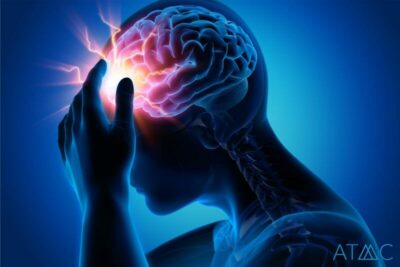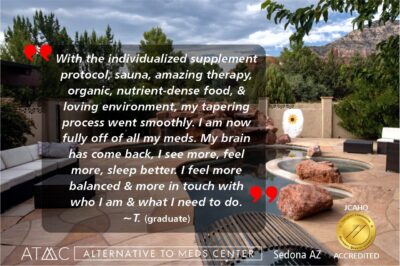Last Updated on May 9, 2024 by
Alternative to Meds Editorial Team
Medically Reviewed by Dr Samuel Lee MD
Table of Contents:

Last Updated on May 9, 2024 by
Alternative to Meds Editorial Team
Medically Reviewed by Dr Samuel Lee MD

Recent research indicates that Ibuprofen activates a protein pathway in the body that in some cases can help reduce the speed of cancer growth, and is thought to help reduce inflammation, though the mechanics involved have yet to be completely determined.9,10

The good news is that you can take natural herbal remedies that have similar pain-relieving and anti-inflammatory properties that ibuprofen has, minus the risk of unwanted side effects.1
These are the most common ibuprofen side effects: abdominal pain, upset stomach, heartburn, indigestion, rash, dizziness, drowsiness, nausea, headaches, ringing in the ears, constipation, heartburn, flushing, diarrhea, feeling faint, feeling lightheaded, and feeling hot or cold flashes. So let’s say you take ibuprofen for a headache, but your headache gets worse and you don’t know why since ibuprofen is supposed to relieve pain. The answer to this is that one of the most common ibuprofen side effects is … headaches. Now you know why your headache didn’t go away.2

Pain is the body’s way of bringing attention to an area that needs to be healed. Taking a pain reliever that can cause further damage can turn out to be risky, made doubly dangerous because the pain signal has been silenced without actually treating the underlying health condition.
Some other signs of ulcer bleeding to be aware of are black or grey stools, feeling weak, and feeling dizzy when standing up. Some people need to be incredibly cautious about consuming ibuprofen. If they have had existing impaired kidney function; ibuprofen reduces the flow of blood to the kidneys and can further impair kidney function. People who have asthma have a high risk of allergic reactions to ibuprofen. Other rare side effects can include severe rashes or DRESS syndrome, blood clots, heart attacks, heart failure, congestive heart failure, hypertension, and fluid retention. 4,5,7
The most risk-free way to completely avoid such problems is by taking a natural pain reliever.
Some natural substances exist that can provide significant relief. For example, ginger contains twelve anti-inflammatory and pain-relieving properties that work the same way ibuprofen does, but without the negative effects.6
More research is being done on effective and safe methods to relieve pain than ever before, and remedies that are available at the health store or local grocery abound.
*A review of 38 studies7 in 2017 demonstrated the benefits of mindfulness meditation for pain relief.

Promoting healing is always better than the “quick fix” method, which is the signature of pharmaceutical “solutions.” While drugs do have their place in medicine and in resolving health concerns, any kind of medication may produce drug reactions that can actually do more harm than good. While dependence on pain medications is not at all unusual in these modern times, access to effective alternative treatments is if not suppressed, generally ignored by the medical industry. You are invited to call Alternative to Meds Center and get the guidance you have been waiting to hear concerning alternative treatments for lingering or chronic pain, inflammation, or other unwanted symptoms and at the same time, avoiding serious ibuprofen side effects.
1. “Ibuprofen for adults (Including Neurofen).” published by NHS [Internet] medically reviewed 2018 February [cited 2020 Oct 26]
2. “Medication Overuse Headaches- Symptoms and Causes.” published by Mayo Clinic [Internet] N.D. [cited 2020 Oct 26]
3. “Ibuprofen Information Sheet” Medline.gov [reviewed 2020 Mar 15] [cited 2020 Oct 26]
4. Preidt R, “Common Painkillers Tied to Blood Clot Risk, Study Says.” WebMD Sept 24 2014 [Internet] [cited 2020 Oct 26]
5. Lyer P, “Increased Risk of Blood Clots with NSAIDS Use.” Physician-Patient Alliance for Health and Safety 2015 April 9 [Internet] [cited 2020 Oct 26]
6. Mcquillan S, “Ginger and Turmeric: A Dynamic Pain-fighting Duo.” published in Practical Pain Management [Internet] 2019 Nov 22 [cited 2020 Oct 26]
7. Hilton L et. al, “Mindfulness Meditation for Chronic Pain: Systematic Review and Meta-analysis” PubMed [Internet] 2017 Apr [cited 2020 Oct 26]
8. Ngo VTH, Bajaj T. Ibuprofen. [Updated 2023 May 29]. In: StatPearls [Internet]. Treasure Island (FL): StatPearls Publishing; 2024 Jan-. Available from: https://www.ncbi.nlm.nih.gov/books/NBK542299/ [cited 2024 May 9]
9. Ishihama, N., Choi, Sw., Noutoshi, Y. et al. Oxicam-type non-steroidal anti-inflammatory drugs inhibit NPR1-mediated salicylic acid pathway. Nat Commun 12, 7303 (2021). https://doi.org/10.1038/s41467-021-27489-w [cited 2024 May 9]
10. Ha MW, Paek SM. Recent Advances in the Synthesis of Ibuprofen and Naproxen. Molecules. 2021 Aug 7;26(16):4792. doi: 10.3390/molecules26164792. PMID: 34443379; PMCID: PMC8399189. [cited 2024 May 9]
11. Bindu S, Mazumder S, Bandyopadhyay U. Non-steroidal anti-inflammatory drugs (NSAIDs) and organ damage: A current perspective. Biochem Pharmacol. 2020 Oct;180:114147. doi: 10.1016/j.bcp.2020.114147. Epub 2020 Jul 10. PMID: 32653589; PMCID: PMC7347500. [cited 2024 May 9]
Originally Published Sep 19, 2018 by Diane Ridaeus

Dr. Samuel Lee is a board-certified psychiatrist, specializing in a spiritually-based mental health discipline and integrative approaches. He graduated with an MD at Loma Linda University School of Medicine and did a residency in psychiatry at Cedars-Sinai Medical Center and University of Washington School of Medicine in Seattle. He has also been an inpatient adult psychiatrist at Kaweah Delta Mental Health Hospital and the primary attending geriatric psychiatrist at the Auerbach Inpatient Psychiatric Jewish Home Hospital. In addition, he served as the general adult outpatient psychiatrist at Kaiser Permanente. He is board-certified in psychiatry and neurology and has a B.A. Magna Cum Laude in Religion from Pacific Union College. His specialty is in natural healing techniques that promote the body’s innate ability to heal itself.

Diane is an avid supporter and researcher of natural mental health strategies. Diane received her medical writing and science communication certification through Stanford University and has published over 3 million words on the topics of holistic health, addiction, recovery, and alternative medicine. She has proudly worked with the Alternative to Meds Center since its inception and is grateful for the opportunity to help the founding members develop this world-class center that has helped so many thousands regain natural mental health.
Can you imagine being free from medications, addictive drugs, and alcohol? This is our goal and we are proving it is possible every day!
Read All StoriesView All Videos